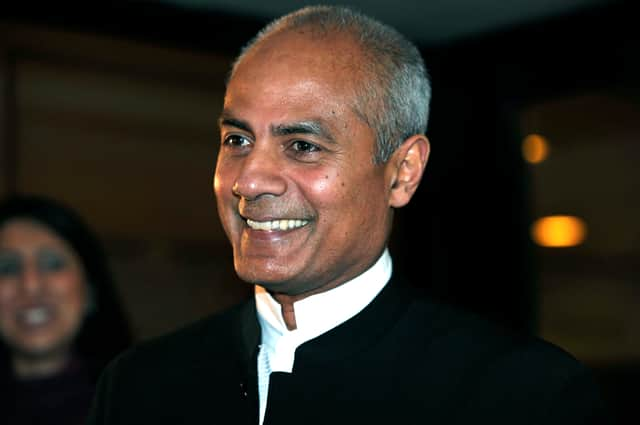George Alagiah: BBC newsreader's final message to viewers - Sophie Raworth tribute video after death


The moving final message of George Aligiah has been revealed.
The award-winning journalist, who hosted BBC News At Six for 20 years, passed away on Monday (24 July), after being diagnosed with bowel cancer in 2014.
Advertisement
Hide AdAdvertisement
Hide AdAlagiah's colleague Sophie Raworth described how the BBC broadcaster's 'final wish' before he died was to return to the air and bid his audience goodbye, an opportunity he never received. Instead, a pre-recorded clip was broadcast to BBC viewers as part of Monday's News at Six.
In a video montage, which featured clips and pictures of the late presenter, Alagiah admitted it had taken him time to process the diagnosis after he was first told he had bowel cancer.
“My life, for what it is worth, is divided into pre-cancer and post-cancer. The weird thing about a bowel cancer journey is you don’t really know the beginning and you don’t really know the end,” he said in the video. “So I know the day I was diagnosed with bowel cancer, but I don’t know when it started.
"Because I was at the top of my game, I was having a fantastic time at work and home, and then suddenly you hear those words ‘I’m sorry to tell you Mr Alagiah, you’ve got bowel cancer’. At first when you’re told, you don’t know how to respond and it took me a while to understand what I needed to do.”
Advertisement
Hide AdAdvertisement
Hide AdHe continued: “For me, I had to get a place of contentment and the only way I knew how to do that was literally to look back at my life.
“Actually, when I look back to my journey, where it all started, looked at the family I had, the opportunities my family had, the great good fortune to bump into Fran who’s been my wife and lover for all these years. The kids that we brought up, it didn’t feel like a failure.
“I wish I hadn’t had cancer, obviously. But I have cancer and I’m glad of the things I’ve learned about myself and about my community, my friends and my family as a result
“I have gotten to a place to see life as a gift. Rather than kind of worrying about when it’s going to end and how it’s going to end, I’ve got to a place where I can see it for the gift it is. I feel that gift keenly every morning.”
Advertisement
Hide AdAdvertisement
Hide AdBefore airing the video, Raworth remembered Alagiah as a “man of great values and indomitable spirit”. She recalled launching the evening news show with him 20 years ago in January 2003, saying that he felt “enormously proud and privileged” to be presenting the programme.
“He loved being in the newsroom, being part of the team, and he made a good cup of tea as well. We all adored him,” she added. “He felt a real connection with the audience too.
"After he was diagnosed with cancer, just over nine years ago, he received thousands of letters and messages from people who wrote to him as if they knew each other, strangers who spoke to him as a friend.
“He was really touched by your support. George was a man of great values and indomitable spirit. A big smile of velvety love, a great friend.”
Advertisement
Hide AdAdvertisement
Hide AdAlagiah, who was born in Sri Lanka, continued to present for the BBC when he was not receiving treatment. After his diagnosis, Alagiah endured two rounds of chemotherapy and several operations, including the removal of most of his liver.
He returned to work after his treatment was over but the cancer came back and spread, leading to breaks from the studio while he received treatment. Following his diagnosis, Alagiah also campaigned for cancer charities, including Macmillan Cancer Support and Bowel Cancer UK, to help raise awareness.
He joined the BBC in 1989 and spent many years as one of its leading foreign correspondents before moving to presenting. He was a specialist in Africa and covered the civil wars in Somalia and Liberia as well as the genocide in Rwanda 20 years ago.
Throughout his career he interviewed central political figures, among them former South African president Nelson Mandela, Archbishop Desmond Tutu and ex-Zimbabwean leader Robert Mugabe.
Advertisement
Hide AdAdvertisement
Hide AdHe was nominated for a Bafta in 1994 for his coverage of Saddam Hussein’s genocidal campaign against the Kurds of northern Iraq and was named Amnesty International’s journalist of the year in 1994 for reporting on the civil war in Burundi.
He first began hosting the 6pm news bulletin in early 2003, but stepped up to front it solo four years later following the departure of his co-host, Natasha Kaplinsky.
Comment Guidelines
National World encourages reader discussion on our stories. User feedback, insights and back-and-forth exchanges add a rich layer of context to reporting. Please review our Community Guidelines before commenting.
